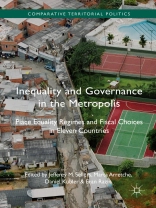This book undertakes the first systematic, multi-country investigation into how regimes of place equality, consisting of multilevel policies, institutions and governance at multiple scales, influence spatial inequality in metropolitan regions. Extended, diversified metropolitan regions have become the dominant form of human settlement, and disparities among metropolitan places figure increasingly in wider trends toward growing inequality. Regimes of place equality are increasingly critical components of welfare states and territorial administration. They can aggravate disparities in services and taxes, or mitigate and compensate for local differences. The volume examines these regimes in a global sample of eleven democracies, including developed and developing countries on five continents. The analyses reveal new dimensions of efforts to grapple with growing inequality around the world, and a variety of institutional blueprints to address one of the most daunting challenges of twenty-first century governance.
विषयसूची
INTRODUCTION.- Chapter One: Place, Metropolitan Inequality and Governance: A Framework for Comparative Analysis (Jefferey Sellers).- PART ONE: THE TIEBOUTIAN MODEL.- Chapter Two: Contested Metropolis: Inequality and the Multilevel Governance of Metropolitan Regions in the United States; Jefferey Sellers.- Chapter Three: Tamed Tieboutianism and Spatial Inequalities: Regimes of Place Equality in Swiss Metropolitan Regions; Daniel Kübler and Philippe Rochat.- Chapter Four: Metropolitan Governance and Inter-Municipal Inequality in Canada’s Metropolitan Regions; R. Alan Walks.- Chapter Five: Metropolitan Governance and Social Inequality in India; Annapurna Shaw.- PART TWO: THE FULL EQUALIZATION MODEL.- Chapter Six: The Equal Metropolis? Can Social Policies counteract diversity in Swedish metropolitan settings?; Anders Lidström.- Chapter Seven: Social and socio-spatial inequalities in Prague metropolitan area Czech Republic; Tomas Kostelecky and Jana Vobecká.- Chapter Eight: The Mosaic of Local Governments: Decentralizing Reforms, Municipal Asymmetries and Spatial Inequality in Post-Apartheid South Africa; Helder do Vale and Robert Cameron.- PART THREE: THE PARTIAL EQUALIZATION MODEL.- Chapter Nine: Place Equality Regimes in French City Regions; Deborah Galimberti and Gilles Pinson.-Chapter Ten: Interlocal Disparities in Israel’s Metropolitan Areas: The Impact of Crisis and Recovery in a Neoliberal Regime; Eran Razin.- Chapter Eleven: Regimes of Place Equality and municipal choices in metropolitan Spain; Clemente J. Navarro; Maria Jesús Rodriguez, Cristina Mateos, Lucia Muñoz.- CONCLUSION.- Chapter Thirteen: Regimes of place equality and metropolitan social inequalities: a cross-national perspective; Jefferey Sellers, Eran Razin, Marta Arretche and Daniel Kübler.
लेखक के बारे में
Jefferey Sellers is Professor of Political Science and Public Policy at the University of Southern California, USA. The author of Governing from Below: Urban Regions and the Global Economy (2005), he is the co-founder and co-director of the International Metropolitan Observatory (IMO), the largest international network for the study of metropolitan regions and their politics, of which this book is the third collective publication.
Marta Arretche is Professor of Political Science and Director of the Centre for Metropolitan Studies at the University of São Paulo, Brazil. She is also the editor of the Brazilian Political Science Review.
Daniel Kübler is Professor of Political Science and Director of the Center for Democracy Studies at the University of Zurich, Switzerland. He is co-director of the International Metropolitan Observatory.
Eran Razin is Professor of Geography, the Leon Safdie Chair in Urban Studies, Director of the Institute of Urban and Regional Studies and Head of Floersheimer Studies, at the Hebrew University of Jerusalem, Israel.












